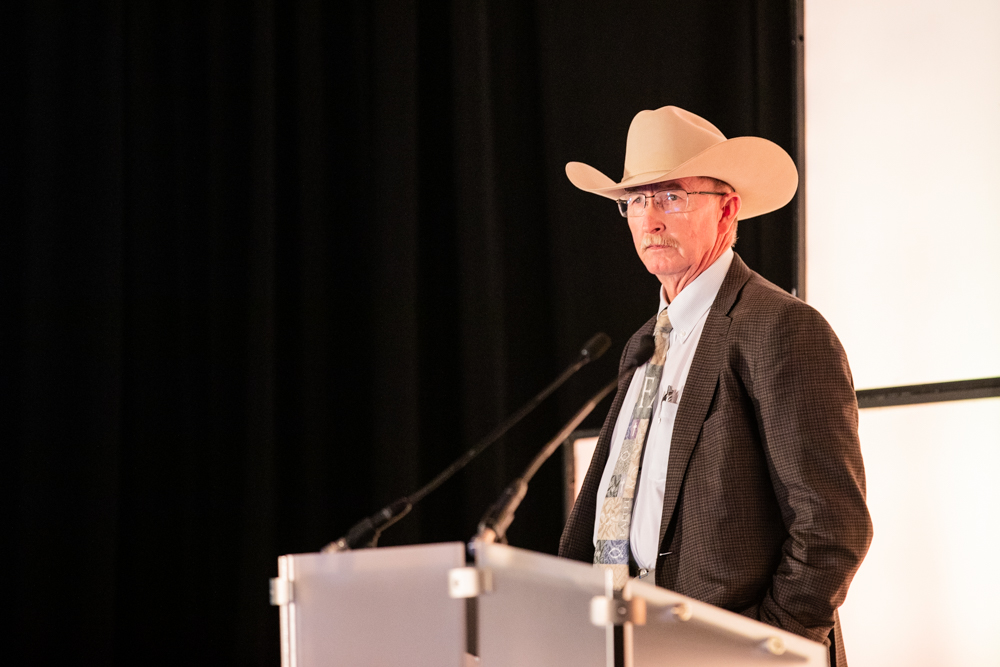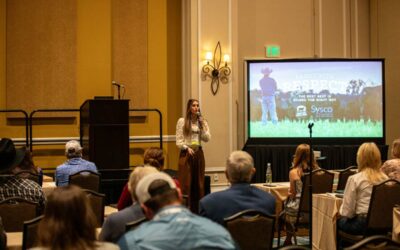
Just a poor ol’ farmer…
September 16, 2011
Top five ways to continue to get better on the ranch
I very distinctly remember the rare occasions in my childhood when mom would pack her bags, say goodbye and leave my brother, sister, dad and I home to fend for ourselves. As a vet tech in town, she would head back to trade school for a week every couple of years for continuing education.
I had no idea what “continuing education” meant at the time. All I knew was that it meant we got a week running around the countryside barefoot, free of baths, eating ice cream (it helped dad’s burnt cooking go down smoother), and generally being little hooligans as dad tried to maintain some level of productivity on the farm.
I remember asking dad why he never had to go back to school. Always a jokester, he would say something to the extent of, “Oh, I’m just a poor ol’ farmer, I don’t need to know much. Your mother’s the one with the brains around here!”
Of course as I got older, I understood exactly how much he really was joking about the first part of that humble statement (although my mother would stand by the latter comment!). He had to know everything about everything… from bovine health and reproduction to monitoring water quality and soil pH balance to how to handy-man any mechanical problem that ailed him.
I was reminded of all this by a tweet Andy Vance shared from the Select Sires National Sales Conference last week. He quoted Dr. Tom Fields, NCBA’s executive director of producer education:
Well… ya. A simple statement, but perhaps an under appreciated one. To stay in business, cattlemen have to be business and technology savvy, up-to-date on current issues and markets and open to new ideas. Otherwise, they simply wouldn’t keep up.
But unlike other professions, cattlemen aren’t required to pursue continuing education to maintain certification, seek a pay raise or stay qualified for general ranch management. It’s up to each guy or gal to keep ahead, and it behooves their profitability to do so. But, like maintaining order amongst three young kids while mom’s away, it’s not always an easy task to accomplish while keeping a farm or ranch running.
So to keep up with Dr. Field’s thoughts, here is our advice for staying on the profit-savvy end of the cattle business. Your top five sources of continuing education in the beef biz:

1) Attend conferences, seminars and industry events: I know it’s hard to get away, but events like these are worth the trip to town. Whether it’s your state cattlemen’s meetings, Feeding Quality Forums, field days, extension-sponsored meetings or the National Cattle Industry Convention, these will be the places to pick up the latest and greatest technology and ideas in the beef business. I’ve read the evaluation reports after conferences and seminars like these, and I know cattlemen like you walk away from them with useful, applicable new knowledge that positively changes the way they do business. Take time to attend at least one each year.
2) Seek consultants: Conferences, seminars and meetings bring industry experts to a central location and put a microphone in front of them, but you don’t always have to travel to find them. Experts can be found all around you, so seek their knowledge out. Make the most of your time with the vet, sit next to the extension beef specialist at your kid’s next 4-H meeting, ask your neighbor how he keeps flies under control so well each spring. Give your breed association field reps a call or look up our CAB beef cattle specialists and just ask them what is new in those organizations. These people are being paid to be a resource to you, so make the most of them!
3) State feeding programs/data collection: We all know the old saying, you can’t manage what you don’t measure. Recording and processing detailed, individual data on your herd may be one of the most useful educational tools you can use. After establishing a solid herd record keeping system, you might think about getting post-harvest information. The best way to give that a try might be to look into a state feeding program to get your feet wet. The folks who organize these will be an incredible resource in explaining your first set of harvest data and then making a plan to improve it for the next year.
4) Reading/researching: That stack of agriculture magazines that pile up next to your chair (ahem!) have useful information in them! But that pile can be overwhelming. Select the 2-3 publications that you find most useful and cancel the rest. Then you can focus on reading articles that are most pertinent to your success. Utilize reliable online resources to seek specific information or research findings. Or take the plunge into the social media world and follow only people and organizations that share information directed toward your needs.
5) On-farm trials: Wondering about the effect a certain management change might have on your ranch? Run a little research trial of your own. It doesn’t have to be complicated. For example, if you’re debating a new implant strategy, run a trial on a small group and track the difference in their progress before you make changes with the whole herd. Nothing like the process of trial and error to teach yourself on what works best on your ranch!
As Gary discussed earlier this week, the cattle business is entering into a new era. How do you stay on top of the game at your farm/ranch? What resources are most valuable to your continuing education?
You may also like
$100,000 Up for Grabs with 2024 Colvin Scholarships
Certified Angus Beef is offering $100,000 in scholarships for agricultural college students through the 2024 Colvin Scholarship Fund. Aspiring students passionate about agriculture and innovation, who live in the U.S. or Canada, are encouraged to apply before the April 30 deadline. With the Colvin Scholarship Fund honoring Louis M. “Mick” Colvin’s legacy, Certified Angus Beef continues its commitment to cultivating future leaders in the beef industry.
Raised with Respect™ Cattle Care Campaign Launched This Fall
Raised with Respect™ was developed as part of a strategic cattle care partnership between Sysco and CAB. The collaboration focuses on supporting farmers and ranchers, equipping them with continuing education to stay current on best management practices and helping to increase consumer confidence in beef production.
Drought Impact and Cattle Industry Dynamics
As drought conditions persist across much of cattle country, farmers and ranchers are at a pivotal juncture in the cattle industry’s landscape. What impact does this prolonged dry spell have on the nation’s herd numbers? When will heifer retention begin? How will industry dynamics influence the spring bull sale season?




